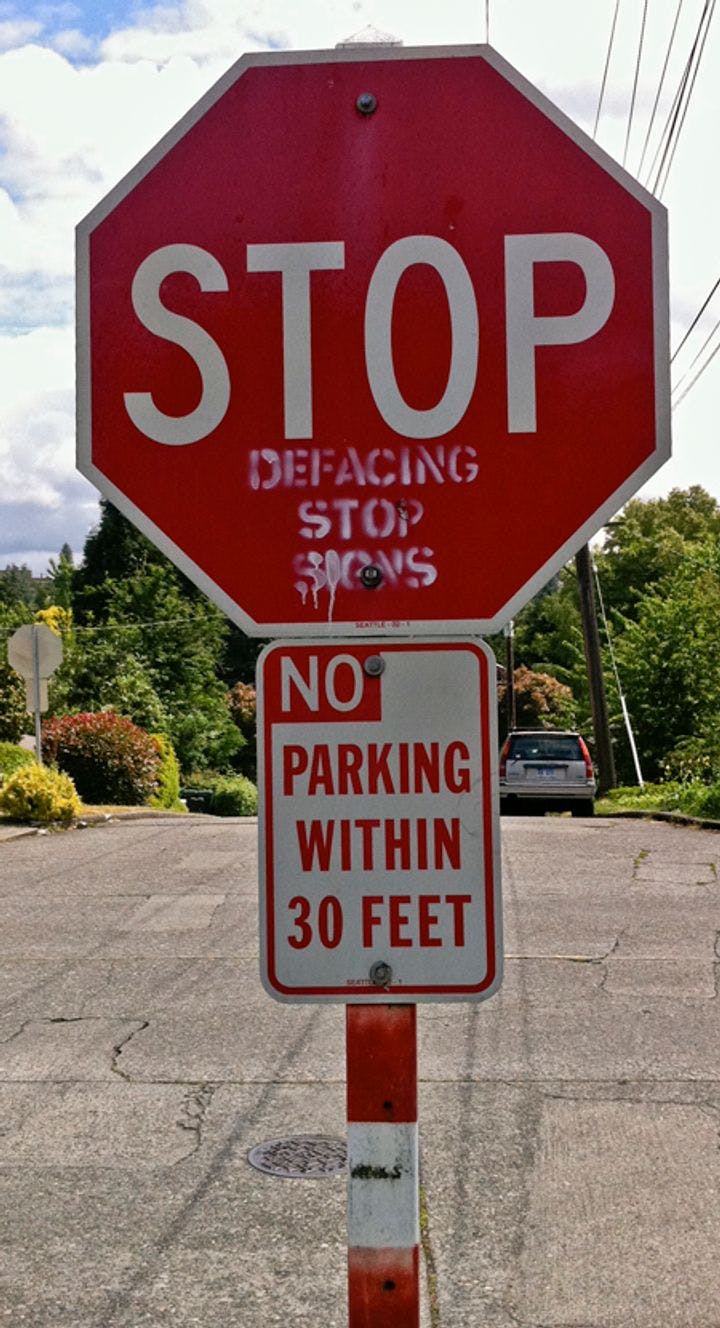Fall 2007
The Cold Eye
– David Beers
David Beers on irony after 9/11.
In September 2001, when the call went forth to chasten the ironic impulse in American life, it seemed, well, rather ironic. The nation had been attacked by apocalyptic fundamentalists, and media commentators were blaming the likes of Jerry Seinfeld and Bart Simpson. Time essayist Roger Rosenblatt wrote, “The ironists, seeing through everything, made it difficult for anyone to see anything. The consequence of thinking that nothing is real . . . is that one will not know the difference between a joke and a menace.” Vanity Fair editor Graydon Carter predicted “the end of the age of irony.”
Six years on, such pious prescriptions have proven “disastrous,” in the view of R. Jay Magill Jr., a writer and illustrator and the former executive editor of DoubleTake magazine. If our political leaders had spiked their worldview with a dose of irony after 9/11, perhaps they’d have sensed blunders in the making. How ironic, then, is a war on terror that produces more terrorists. Or U.S. officials’ depriving people of rights and liberties to prove that America is a bulwark of democracy.
In fact, it’s the “critical tool” of irony that can help address the societal ills for which irony is often blamed: selfishness, civic apathy, hypocrisy, self-absorption, the loss of “our sense of proportion and self-restraint and humility.” Magill’s “big, happy irony family”—which encompasses the ways we “express intentions through language [that] are frequently askew of their literal meaning”—includes satire, so formidable in its power to scold while also amuse.
Magill draws a vital line between the thoughtful ironist and the sarcastic slacker. And he places the ironic citizen at odds not only with the religious conservative, but also with the cynic, who assumes the world is hopelessly “brutish” and who “has given up entirely on performing a social role.” (The book’s title plays off philosopher Peter Sloterdijk’s observation that “chic bitterness” is the favored style of cynics just out for themselves.)
The ironist, by contrast, believes that society can be improved. To be effective, though, this reformer must remain true to self, shielded from phoniness by ironic detachment. As essayist Randolph Bourne wrote in 1913, “The ironist is ironical not because he does not care, but because he cares too much.”
The mutual distrust between people who are ironic and people who are not is at least as old as Socrates, whose pretense to ignorance for the sake of revealing truth offended the forthright Aristotle. Magill deftly traces the evolution of intellectual thought about irony, parsing Kierkegaard, Hegel, Nietzsche, and others, and he mulls the achievements of some of the great practitioners of our day, including the ultra-self-reflexive author Dave Eggers and Stephen Colbert, creator of a pompous television alter ego. (Very little is said, though, about how blacks, Native Americans, and others have refined ironic humor to cope with injustice and skewer their oppressors.)
Magill does chronicle how both sensibilities—the one that seeks godly certitude, and the other that tweaks it—have been woven into America’s intellectual DNA from the beginning. One grandson of the great colonial fire-and-brimstone preacher Jonathan Edwards was Timothy Dwight, a gifted political satirist. Two centuries before The Onion began publication, Philip Freneau was zinging Federalists with his own hilarious fake news stories. The ironic tradition has been passed from Washington Irving to Mark Twain to Jon Stewart, and Magill declares, “Satire is again serious business.”
But as Christopher Lasch noted two decades ago, the ironic stance is more defensive than proactive. It’s the natural crouch of a person bombarded with lies in an over-commercialized public realm. If irony is hot again, does this signal that Magill’s ideal ironists are on the march, their imaginations revved for political reform? Or has irony become merely a personal style of coping? What does it mean if everyone is in on the joke, but the joke is still on us?
* * *
Reviewed: "Chic Ironic Bitterness" by R. Jay Magill Jr., University of Michigan Press, 2007.
Photo courtesy of Wikimedia Commons
